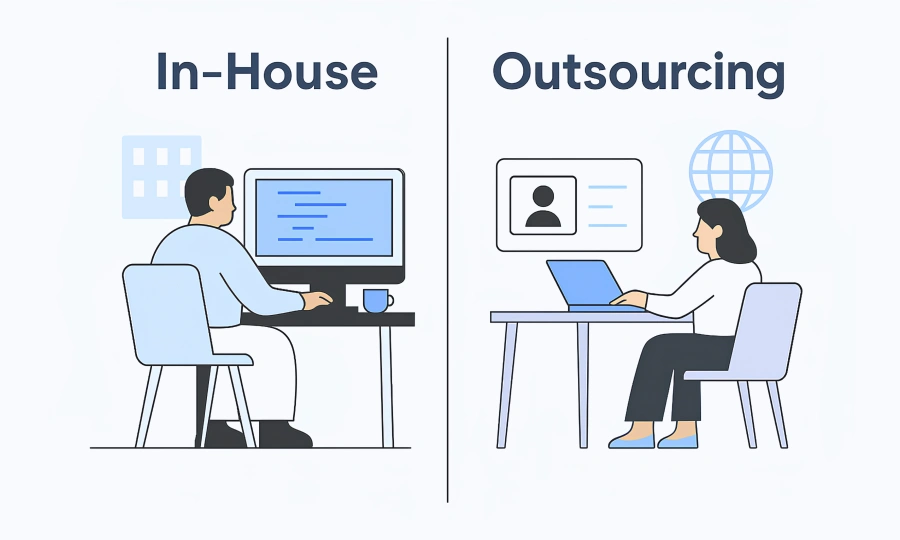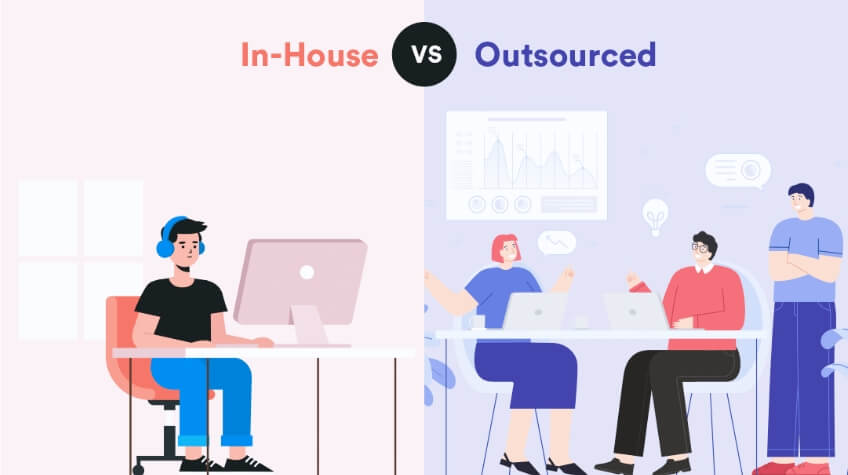Every game studio faces the same moment of truth. A promising project gains momentum, deadlines loom closer, and suddenly the team realizes they need more hands on deck fast. The question that follows keeps studio heads awake at night: should they hire more people permanently, or bring in outside help? This decision shapes everything from budgets and timelines to the final quality of the game itself.
The stakes have never been higher. According to Market.us research, the global game outsourcing services market is projected to grow from USD 1,865.2 million in 2024 to USD 9,043 million by 2034, expanding at a compound annual growth rate of 17.10%.
This explosive growth signals a fundamental shift in how studios approach development. Understanding the real differences between building teams internally versus partnering with external developers can mean the difference between a successful launch and a failed project.
Understanding In-House Development
Building an internal team means recruiting, training, and maintaining a permanent workforce dedicated exclusively to studio projects. These developers become part of the company culture, attend every meeting, and develop deep familiarity with the studio’s workflow and vision.

The permanent nature of in-house teams creates both stability and rigidity. Studios gain reliable team members who deeply understand their games but lose flexibility when needs change suddenly or specific expertise becomes necessary for short periods.
Exploring Game Development Outsourcing
Outsourcing shifts specific development tasks or entire project phases to external partners—specialized studios, freelancers, or development agencies located anywhere in the world. These arrangements range from hiring a single artist for character models to partnering with a full-service studio that handles everything from concept to final testing.
The model has matured significantly. Modern outsourcing partners integrate seamlessly with internal teams using collaborative platforms, regular video calls, and shared project management tools. Many specialize in particular areas like animation, quality assurance, localization, or technical optimization for specific platforms.
When studios outsource game development, they tap into a global talent pool without geographical limitations. Need an expert in virtual reality optimization? A studio in Eastern Europe might offer exactly that skill set. Require rapid expansion for a critical production phase? Scale up instantly without permanent hiring commitments.
Cost structures differ fundamentally from in-house operations. Studios pay only for work completed, avoiding the overhead of full-time employees during slow periods. They access senior-level expertise without matching the salaries top developers command in expensive markets like Silicon Valley or London.
Outsourcing vs. In-House Game Development
Breaking Down the Cost Comparison
Budget considerations drive many outsourcing decisions, but the real financial picture extends beyond hourly rates or project quotes.
In-house development costs include:
- Competitive salaries that often exceed six figures for experienced developers
- Health insurance, retirement contributions, and other benefits adding 30-40% to base salaries
- Office space, utilities, equipment, and software licenses
- Recruitment fees, training costs, and onboarding time
- Ongoing professional development and team building activities
Outsourcing expenses typically cover:
- Project fees based on deliverables rather than time
- No benefits, office costs, or equipment investments
- Minimal management overhead once relationships establish
- Flexibility to scale spending up or down with project needs
Studios in expensive markets often find outsourcing dramatically reduces costs. A senior developer in San Francisco might cost $150,000 annually plus benefits, while an equally skilled developer in Poland or Ukraine charges $60-80 per hour with no additional overhead. For a six-month contract, the savings become substantial.
However, hidden costs exist. Coordination takes time and effort. Misunderstandings require rework. Quality control demands more attention with distributed teams. Some studios discover that managing external partners consumes resources they expected to save.
Quality Control and Communication Challenges
Quality represents the ultimate measure of any development approach. Both models can produce excellent results or disappointing failures depending on execution.
Communication challenges often determine outsourcing success or failure. Time zones complicate scheduling when one team ends their day, another begins. Language barriers create misunderstandings about requirements or feedback. Cultural differences affect working styles and expectations.
Flexibility and Scalability Considerations
Game development follows unpredictable rhythms. Early stages need small teams exploring concepts. Production ramps up requiring large teams working simultaneously. Post-launch support might need just a few people fixing bugs and releasing updates.
Outsourcing provides the flexibility studios crave. Need twenty additional artists for three months?
External partners can deliver. Require specialized optimization for Nintendo Switch?
Contract experts with that exact experience. Post-launch support becomes manageable by scaling back to a small core team plus targeted external help.
When In-House Development Makes Sense
Despite outsourcing’s growth, in-house development vs outsourcing isn’t a simple choice with one clear winner. Certain situations strongly favor building internal teams.
Choose in-house development when:
- Core gameplay mechanics require constant iteration and refinement
- Proprietary technology or engines demand deep institutional knowledge
- Company culture and unified vision matter more than efficiency
- Long-term projects benefit from team stability and continuity
- Security concerns prevent sharing sensitive intellectual property
- Budget allows for permanent staff and values their benefits outweigh flexibility
Studios building flagship franchises typically rely heavily on in-house talent. These games represent brand identity and require teams that live and breathe the studio’s vision for years. The accumulated knowledge within permanent teams becomes invaluable for sequels and expansions.
Early-stage studios developing unique gameplay innovations often need the tight integration only in-house teams provide. When exploring uncharted territory, the ability to pivot quickly based on daily discoveries matters more than cost efficiency.
When Outsourcing Delivers Better Results
Conversely, specific scenarios make external partnerships the obvious choice.
Consider outsourcing when:
- Projects need specialized skills for limited time periods
- Rapid scaling up or down matches fluctuating development phases
- Budget constraints prevent hiring permanent staff
- Geographic expertise matters (localization, regional content, platform-specific optimization)
- Testing and quality assurance require broad device coverage
- Routine tasks distract core teams from creative work
Mobile games frequently outsource porting across hundreds of device configurations. No studio maintains enough devices internally for comprehensive testing, making external quality assurance partners essential.
Making the Right Choice for Your Studio
No universal answer fits every situation. The right model depends on project requirements, budget realities, and strategic priorities. Small indie studios often start with mostly outsourced work, bringing tasks in-house as they grow. Large studios maintain substantial internal teams while selectively outsourcing specialized needs.
Smart studios assess needs honestly. What skills exist internally? Where do gaps create bottlenecks? What can the budget sustain long-term? The decision between in-house development vs outsourcing shapes everything from culture to capabilities to financial health. By understanding the real tradeoffs of each approach, studios can make choices that serve their games, their teams, and their players.


